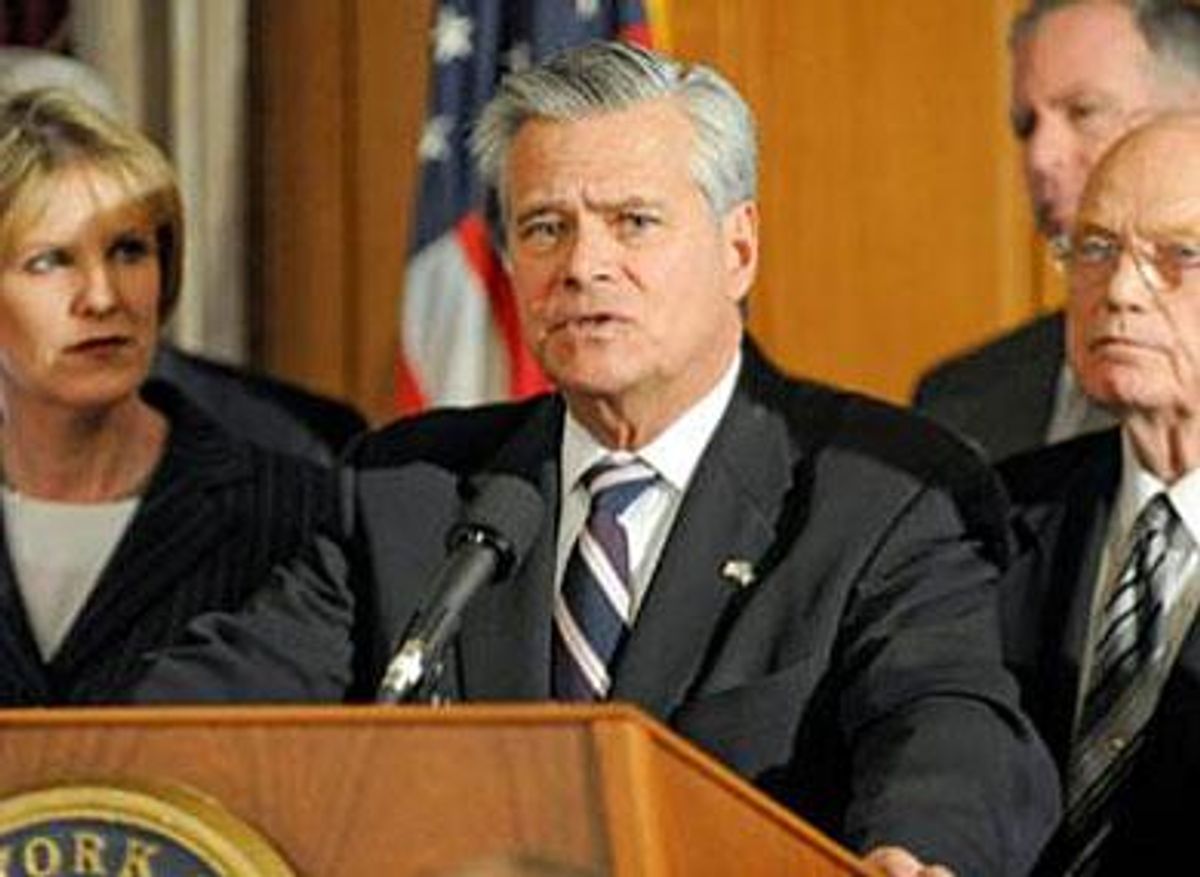World
No Senate Decision on Marriage Equality Bill in New York
No Senate Decision on Marriage Equality Bill in New York

By continuing to use our site, you agree to our Private Policy and Terms of Use.
No Senate Decision on Marriage Equality Bill in New York
No Senate Decision on Marriage Equality Bill in New York

In remarks to reporters following a four-hour conference meeting Wednesday afternoon in Albany, senate majority leader Dean Skelos said that no decision had been made whether to bring the marriage equality bill to the floor for a vote, and that his members would continue to conference the issue on Thursday.
His widely reported comments provided no indication of the content of the proceedings and what might be the sticking points.
"The issue has not been resolved and I will respect the decision of the conference once it's made, but the conference has asked me to keep the confidence of the conference at this point, which I intend to do," said Skelos.
The announcement of no decision followed a tense period in which advocates waited to hear the results of the closed-door conference that began mid-morning and ended in the early afternoon. As the majority party in the senate, Republicans hold the power to decide whether or not to bring the marriage equality bill submitted by Gov. Andrew Cuomo to the floor for a vote in the next few days before the legislative session's scheduled end on Monday.
Skelos has said that although he personally opposes the bill, he would recommend it come to the floor pending consultation with his members. As of Wednesday morning, two Republican state senators who voted against the bill in 2009, James Alesi of Rochester and Roy McDonald of the capital region, have announced they would vote yes, bringing the measure within one vote of the 32 required for passage.
The decisive vote must come from a Republican senator, where since Monday, when three undecided Democrats from New York City who voted against the bill in 2009 - Joseph Addabbo, Shirley Huntley and Carl Kruger - announced their support, all Democrats except the avowedly antigay Ruben Diaz Sr. plan to vote for the bill. While one vote would clinch passage, it is possible that at least two Republicans or more would commit to a yes vote in order to provide political cover and prevent any one member from being targeted by marriage equality opponents.
On Tuesday, Cuomo submitted a bill for consideration with exemptions for religious institutions that do not want to solemnize same-sex marriages or provide facilities for wedding celebrations. An apparent accommodation to concerns expressed by undecided Republican state senators, in particular Greg Ball, the language spells out existing provisions of the state's human rights law, where such religious facilities already are regarded as private and not public accommodations. If passed, the bill would become law in 30 days.
The delivery of the bill provided a strong sign of confidence from Cuomo, who has said that he did not want to hold a vote that would fail. Coupled with the support from the remaining undecided Democrats, it also put the burden squarely on senate Republicans.
However, Ball circulated a letter on Wednesday morning that indicated he wants to see more substantive carveouts for religious institutions than those included in the Cuomo bill. One of his demands, asking that "no religious or tax exempt organizations shall be required to provide any services to which they object because of religious or other beliefs," would seem to suggest concerns about adoption and foster care providers. Catholic Charities in Illinois and Washington, D.C. this year have stopped providing those services rather than comply with the new civil unions and marriage equality laws.
As the 32-member Republican conference met Wednesday, enormous pressure was being exerted on the handful of senators publicly identified as undecided including Ball of Carmel, Stephen Saland of Poughkeepsie, Kemp Hannon of Long Island, Mark Grisanti of Buffalo, and Andrew Lanza of Staten Island. Groups lobbying strongly against the bill include the New York State Catholic Conference, where Archbishop Timothy Dolan wrote Tuesday that same-sex marriage could be compared to the social control of Communist countries such as China and North Korea.
If Republican senators decide to bring the bill to the floor, a likely day for a vote would be Friday, according to senate observers. Cuomo could also issue a message of necessity in an attempt to expedite the process, which could prove advantageous, particularly as lobbying and political calculations around the bill intensify while the legislature faces other unfinished business before it concludes on June 20.
The Democratic-controlled assembly, which has passed the bill three times since 2007, was prepared to act and pass the bill for the fourth time later on Thursday.
Passage of the bill in the senate would make New York the sixth state, in addition to the District of Columbia, with a marriage equality law. The home of 20 million people, New York would also become the most populous state with marriage equality outside California, where Proposition 8 repealed the law in 2008, effectively doubling the number of Americans who live in a state where same-sex couples can marry.
Want more breaking equality news & trending entertainment stories?
Check out our NEW 24/7 streaming service: the Advocate Channel!
Download the Advocate Channel App for your mobile phone and your favorite streaming device!
